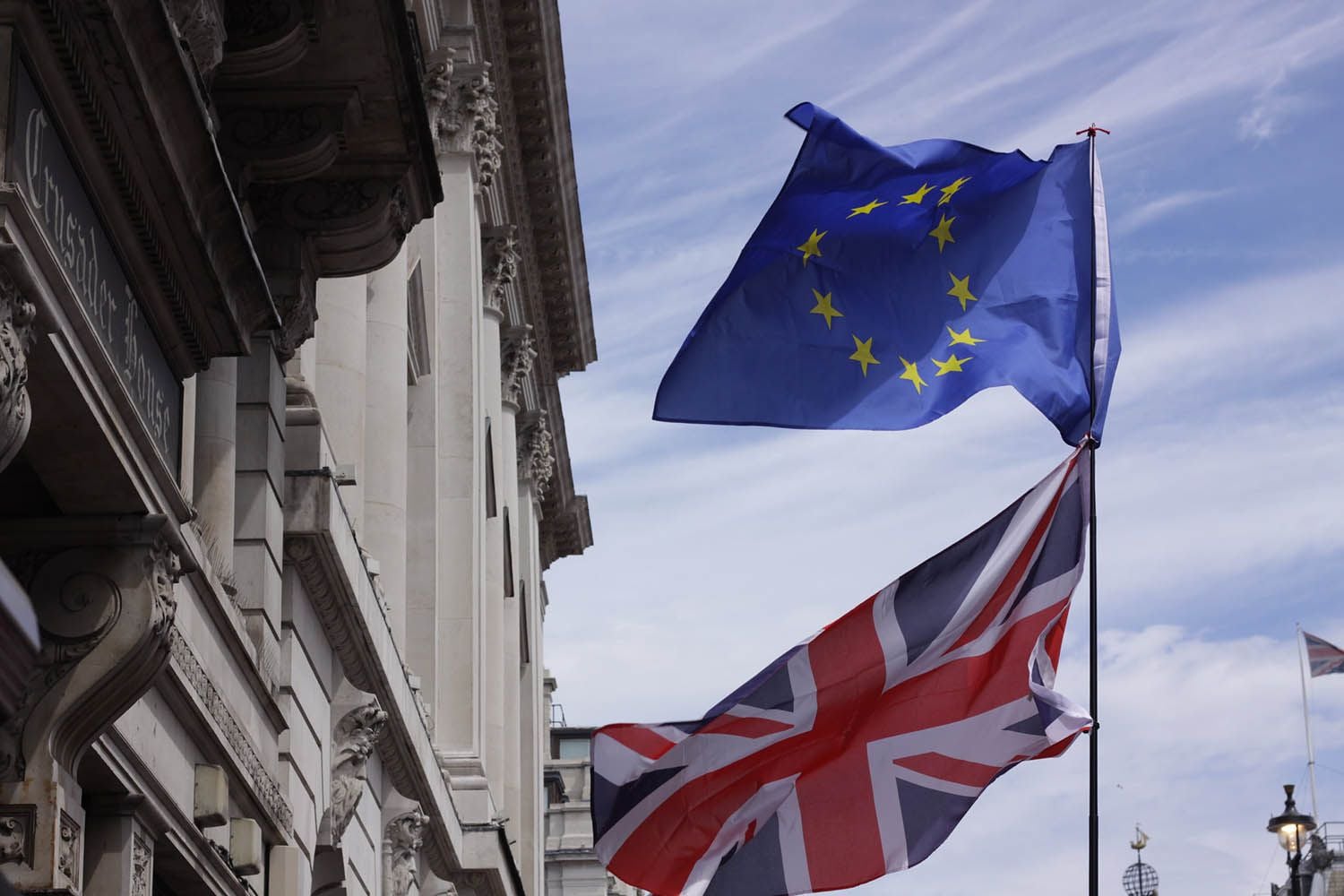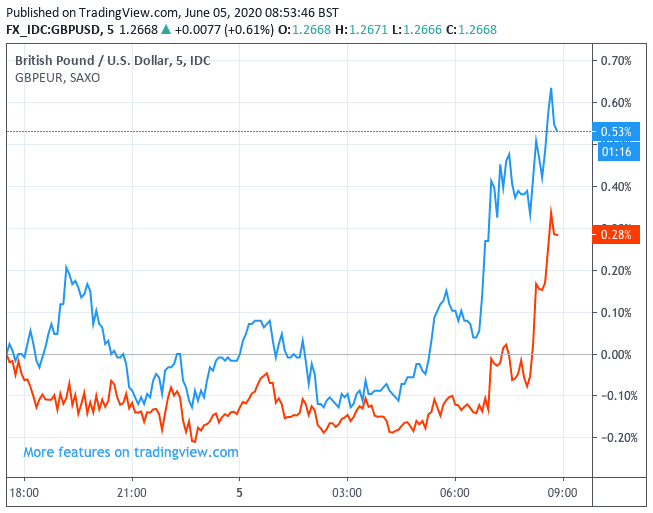Pound Sterling Firms on Friday, Stalled Brexit Talks Take the Shine of Weekly Gains vs. Euro and Dollar
- Sterling bid higher amidst strong market rally
- Brexit trade negotiations end in stalemate
- Sterling to be capped by anxieties over trade talk failure

Image © Stephen Darlington, accessed Flikr, reproduced under CC licensing
- GBP/EUR spot: 1.1160 | GBP/USD spot: 1.2668
- GBP/EUR bank rates: 1.0950 | GBP/USD bank rates: 1.2413
- GBP/EUR specialist rates: 1.1060 | GBP/USD specialist rates: 1.2550
- Find out more about the above
The British Pound advanced against the Euro, Dollar and other G10 currencies ahead of the weekend, supported by another sizeable rally in global equity and commodity markets, confirming that broader investor sentiment still matters for the UK currency and it is too early to take fright over stalled Brexit trade negotiations.
The Pound saw a notable increase in value when London markets opened suggesting an inflow of foreign investor capital into UK assets, with the FTSE 100 jumping by a percent in sympathy with other European bourses, confirming focus for the UK currency remains a mixture of investor sentiment, Brexit trade negotiation risks and Bank of England policy expectations.
"The capacity for this bull run to continue higher has been given a boost once more as the European Central Bank announced a larger than expected increase to its pandemic support programme. The risk recovery is back in full swing after the ECB increased its Pandemic Emergency Purchase Programme by more than expected at a further €600bn," says Richard Perry, analyst at Hantec Markets. "The selling pressure on the Dollar continues to pull GBP/USD higher. It has looked in recent days though the bulls were losing steam, but once more this morning there has been another push higher."
The British Pound held onto its Friday gains against the Euro, Dollar and Pound despite the latest round of Brexit negotiations revealing a tight deadlock between the EU and UK.
The EU's Chief Negotiator Michel Barnier has on Friday confirmed what foreign exchange markets were expecting: that the EU and UK still remain too far apart to strike a post-Brexit trade deal.
Barnier delivered a press briefing following the conclusion of this week's negotiations - the last before the end-June deadline by which an extension must be agreed - saying there had not been significant progress on fisheries, level playing field provisions, governance, and police & judicial cooperation.
"On all these points, we are asking for nothing more than respect of the Political Declaration," said Barnier. "We must stick to our commitments if we want to move forward! In all areas, the UK continues to backtrack on the commitments it has undertaken in the Political Declaration."
The reaction of Pound Sterling suggests the market had been expecting the outcome, with the Pound-to-Euro exchange rate defending earlier gains around 1.1162 and the Pound-to-Dollar exchange rate holding near multi-day highs at 1.2655.
Above: Gains in the GBP/EUR (orange) and GBP/USD (blue) were registered when London markets opened for the day.
UK Chief Negotiator David Frost said in a statement, "progress remains limited but our talks have been positive in tone. Negotiations will continue and we remain committed to a successful outcome.
Frost says the UK is talking to the European Commission about setting up face-to-face talks in order to make a breakthrough. "We are willing to work hard to see whether at least the outline of a balanced agreement, covering all issues, can be reached soon," said Frost.
Media outlets had prepared markets for Barnier's dour tone after it was reported on Thursday that both sides would likely declare they remain far apart on key issues including future alignment of business regulations and access to UK territorial fishing waters following three days of virtual talks.
EU officials told the FT that, while some headway had been made in areas such as security co-operation, no breakthrough was achieved on the EU’s demands that the UK sign up to a "level playing field" of environmental, labour market and competition rules in exchange for extensive access to the European market.
The UK argues the demands would bind the UK to the EU’s legal order and violate the country's sovereignty.
The EU's Chief Negotiator Michel Barnier will brief the media from Brussels following the conclusion of talks, and we would expect his opposite number David Frost to do the same.
"Our bias into June is for a weaker Pound and a test of the range lows. Our preferred expressions would be versus EUR, CHF and JPY," says Kamal Sharma, FX Strategist at Bank of America Securities. "The UK government is unlikely to unilaterally ask for an extension to the Transition Agreement which is due to expire by the end of the year."
1/ Don't expect white smoke from Michel Barnier and David Frost when they wrap up the fourth round of Brexit talks this afternoon. Still gaps in both sides' fundamental positions – governance, level-playing field and fisheries. But this doesn't mean talks are not moving forward.
— Joe Barnes (@Barnes_Joe) June 5, 2020
"Brexit returns as major headache for the Pound," says Petr Krpata, Chief EMEA FX Strategist at ING. ING forecast the GBP/EUR exchange rate to fall to 1.0980 by end-June "as the likely limited progress in the UK-EU trade negotiations and the no extension of the transition period should translate into further built up of risk premium into GBP".
Despite the current round of negotiations ending in disagreement it is telling that the bottom has not fallen out of the Sterling market, in fact the currency started the week in rude fashion against the Euro and Dollar by rising in excess of a percent.
In fact, the Pound is on course to end the week 2.47% higher against the Dollar, its largest weekly advance since mid-March.
The reason for the Pound's relative resilience is twofold: 1) markets have had more than enough time to digest an inevitable lack of progress in these first rounds of trade negotiations and 2) it is clear that there is still a great deal of time and opportunity to seal a deal.
Indeed, a deal will only come about late in the day, as is traditional in such negotiations and therefore it might prove unwise for traders to hit the sell button on the Pound just yet.
It now appears the foreign exchange market's focus will fall on a meeting between Prime Minister Boris Johnson and European Commission President Ursula von der Leyen at some point later this month, where efforts to unblock trade negotiations will be made.
"Sterling could jump in value if a mooted meeting between UK PM Boris Johnson and European Commission President Ursula von der Leyen makes a European Union/UK trade deal more likely by the end of the year," says Robert Howard, a Reuters market analyst.
Yet, even expectations for a breakthrough in June appear overly optimistic to us, after all the extension is due to end in December and politicians on either side of the channel will be expecting this to be the 'hard' deadline to play towards.
Any agreement that comes before December risks making either side look week: the French have to fight for their fisherman and know that even the smallest of concessions will look as though Macron has betrayed this small but very vocal constituency. Johnson will meanwhile want to have a deal sewn up as soon as possible but he has his own Conservative Party eurosceptic MPs to consider and a deal that is considered soft could exact significant political damage.
"Politicians tend to be reluctant to give in too early, as it would look like the ‘selling price has been too low’. We saw this happening when Theresa May first reached an agreement despite saying ‘no deal is better than a bad deal’, followed later by Prime Minister Boris Johnson when he reached a renewed agreement despite his ‘do or die’ speech," says Mikael Olai Milhøj, Senior Analyst at Danske Bank.

